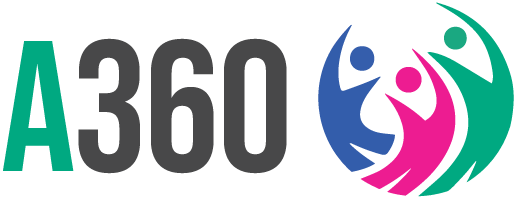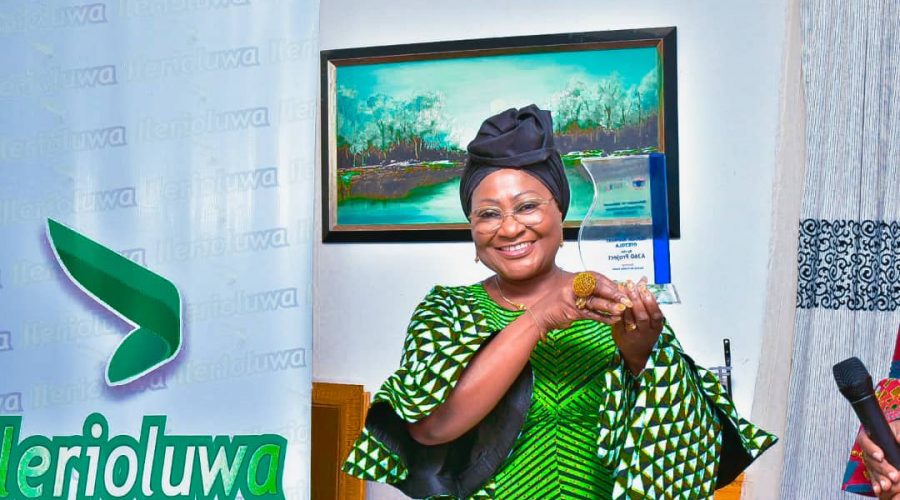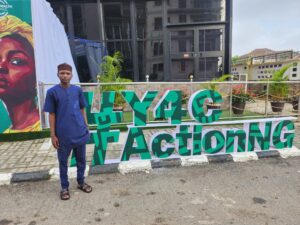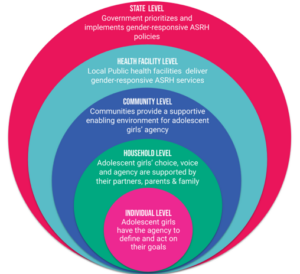A Spotlight on Her Excellency Alhaja Kafayat Oyetola, First Lady of Nigeria’s Osun State
By Kasey Henderson, Senior Associate Communications Manager, A360, PSI
Removing the deep cultural and societal challenges that limit girls’ reproductive health journeys necessitates change – from the grassroots to the grasstops levels.
And in Southern Nigeria’s Osun State, the First Lady proves that by working within the complexity of the health system, leaders at all levels can support girls’ access to the health services they want and need.
Mrs. Kafayat Oyetola, the First Lady of Osun State and chairperson of the Southern Governors’ Wives Forum (SGWF), is a long-time humanitarian and philanthropist. As the founder of Ilerioluwa Development Initiative, Mrs. Oyetola has always been passionate about enhancing the standard of living for women and children, creating gender equality and thus more prosperous communities.
The A360 team in Nigeria recently met with the First Lady where she agreed to be an ambassador for sexual and reproductive health. She spoke with A360’s communications lead Kasey Henderson about her hopes, her policy priorities and her vision for the future of Nigerian women and girls.
Kasey Henderson: What inspired you, and what keeps you motivated to advocate for the advancement of girls and women?
H.E. Mrs. Kafayat Oyetola: Beginning in childhood, Nigerian girls are seen as less than boys. The lack of government resources allocated for girls’ economic, education and cultural development sets systems that relegate them to secondary positions within society. The access and privilege that I have as the First Lady of Osun State, allows me to champion for the betterment of women and girls throughout my country.
However, my advocacy work began in 2004 – 14 years before I became First Lady in 2018 – after visiting a psychiatric hospital and meeting women who did not have access to the vital health services that they needed. I wanted to help these women. Being able to take care of those around me and touch the lives of Nigerian women and girls inspires me every day to continue my work. While there are countless underlying barriers that need to be tackled before we see lasting change for them, I stay motivated by remembering the smiles I have seen on the faces of women and girls who have benefited from these services and health programs.
KH: You are bettering the lives of women and girls across Nigeria. What does that mean to you on a personal level?
H.E. KO: By supporting people with services that can positively change their lives, we are building strong societal pillars grounded in hope. I am humbled by the women and girls that benefit from these services and know that by supporting them, I am also supporting the development and improvement of our society. And through the work of my NGO, Ilerioluwa Development Initiative, I have seen women and girls push beyond traditional expectations to lead happier and healthier lives. This impact has propelled me to continue advocating for maternal, child and adolescent sexual and reproductive health.
KH: What do you want young girls to know about their power to make their own health choices?
H.E. KO: I have dreams of Nigeria as an even greater nation – with women and girls free to make the choices they want in their lives.
But statistics show that women and girls account for half of the population in the world. In Nigeria, the situation is no different. My hope is that we don’t forget about half of our society. When we lift women and girls up,, we will see a generation of women and girls who are able to make informed economic, educational and cultural decisions about their lives.
In Osun State, our administration has made it a priority to advance health delivery services for women and girls. Our governor has renovated health facilities in each of our local governments to increase access for individuals. It is my hope that this enhances the health of children throughout the country.
I want our young girls braced with the health information and access that they need, especially as Nigeria’s healthcare system develops. I want them to know that the first step in their healthcare journey is their decision to seek health services. I want them to know they have the power to take advantage of the development happening in our country. Girls deserve greater power over their health – but this is only possible if girls have a clear understanding of the services available and accessible to them.
KH: How do you envision Nigeria’s adolescents will access health services in 10 years? What policy priorities are integral to achieving this vision?
H.E. KO: In 10 years I envision adolescents having unfettered access to quality, affordable health services throughout the country.
In Nigeria today, there is an intense effort to ensure that individuals nationwide are covered through Nigeria’s national health insurance policy. As a key step to accessing health services, individual Nigerian states have also been rolling out their own health insurance policies. Once we’ve reached national health coverage for all Nigerians, the next step will be to address the infrastructure of health care facilities.
We’re already seeing many states renovating current health facilities and hope to see more renovation moving forward. And to support these developments, I developed the Gbebiro Initiative to tackle the issue of maternal and child health beginning during pregnancy. This initiative ultimately strives to improve comprehensive healthcare for adolescents – from good nutrition to food accessibility to the elimination of harmful female genital mutilation practices – to guarantee a better, safer and healthier future for Nigerian women and girls.
Between policy, renovation and modernization of health facilities and health financing, we can change the course for how adolescents access health services, include reproductive healthcare.
KH: What advice would you give to young people and adults working to support girls to plan for the lives they want to live?
H.E. KO: We live in the age of information and science – my advice for anyone working to support girls is to utilize these tools in their work. Girls need enabling environments to access relevant and important health knowledge and by relying on digital platforms, we can ensure girls have the knowledge they need to lead positive and impactful lives. Engage young people where they are – with communication through platforms they understand like social media – to reach them with the knowledge they want and need. It is also important to share health information with adults, especially women, as they explore services available to them and learn more about the importance of agency and autonomy when making decisions about their lives and their health.




